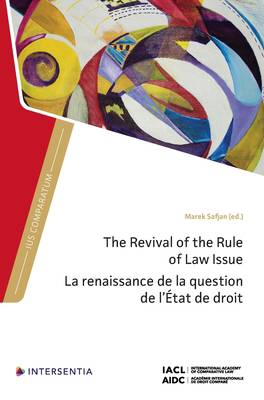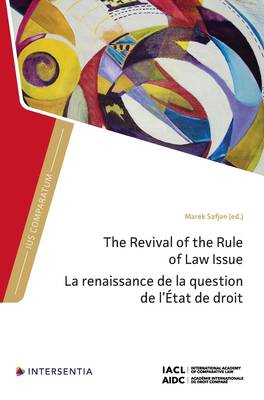
- Retrait gratuit dans votre magasin Club
- 7.000.000 titres dans notre catalogue
- Payer en toute sécurité
- Toujours un magasin près de chez vous
- Retrait gratuit dans votre magasin Club
- 7.000.0000 titres dans notre catalogue
- Payer en toute sécurité
- Toujours un magasin près de chez vous
Description
The Revival of the Rule of Law Issue brings to light the diversity of approaches to the rule of law in contemporary legal systems on one hand; on the other, it addresses those components that can be recognised as constituting the essence of the concept of ‘rule of law’. A comparative analysis diagnoses the most pressing threats and deficits that pose a risk to the proper, effective functioning of a system based on the rule of law, and makes predictions concerning the direction of further development of the principle of rule of law. Broadly speaking, this volume asks whether, in today’s world, one can justifiably formulate a thesis about the revival of this principle and, if so, in what sense.
The first and fundamental conclusion of the principle of the rule of law cannot, in accordance with the dominant approach in the contemporary world, be reduced to purely formal adherence to the provisions of positive law. Further significant requirements must also be met, including respect for fundamental rights; the mechanism of the separation of powers (checks and balances); and democratic mechanisms of exercising power. Against the background of the reports, one important conclusion of this volume is the recognition that, in every democratic rule-of-law system, a mechanism for real, effective control that limits the discretion of any one branch of government should exist. Contemporary legal systems in fundamentally democratic countries are not free from significant flaws, weaknesses or deficits in rule of law guarantees. The most concerning phenomenon is the so-called systemic or structural crisis of the rule of law, which is characterised by the simultaneous occurrence of a whole set of factors blocking the effective, proper functioning of the mechanisms of a legal state, and which primarily threatens the independence of the judiciary.
To maintain the principle of the rule of law, formal—even strong—normative guarantees expressed in such high-rank acts as a constitution, referring to democratic mechanisms, fundamental rights and institutional solutions, may prove insufficient under certain conditions if not accompanied by good and established constitutional practice, as well as sufficiently developed constitutional and civic awareness, and effective mechanisms for ensuring legal compliance.
This volume comprises 25 reports, encompassing not only national systems (from European and non-European countries), but also analyses from the perspective of such international organisations as the European Union, the Organization for Security and Co-operation in Europe and the Council of Europe (Venice Commission).
Prof. Marek Safjan was the Polish judge at the Court of Justice of the European Union from 2009 to 2024. He is Professor emeritus of the University of Warsaw and was the Vice-Rector of the University from 1994 to 1997. Through numerous publications, he has been an active contributor to legal research in the fields of civil law, medical law, and European law. He was appointed as a judge of the Polish Constitutional Tribunal in 1997 and became President of the Tribunal in 1998. He continued in that role until 2006.
Spécifications
Parties prenantes
- Auteur(s) :
- Editeur:
Contenu
- Nombre de pages :
- 632
- Langue:
- Anglais
- Collection :
Caractéristiques
- EAN:
- 9781839705458
- Date de parution :
- 29-10-24
- Format:
- Livre relié
- Dimensions :
- 170 mm x 240 mm
- Poids :
- 1241 g

Les avis
Nous publions uniquement les avis qui respectent les conditions requises. Consultez nos conditions pour les avis.






